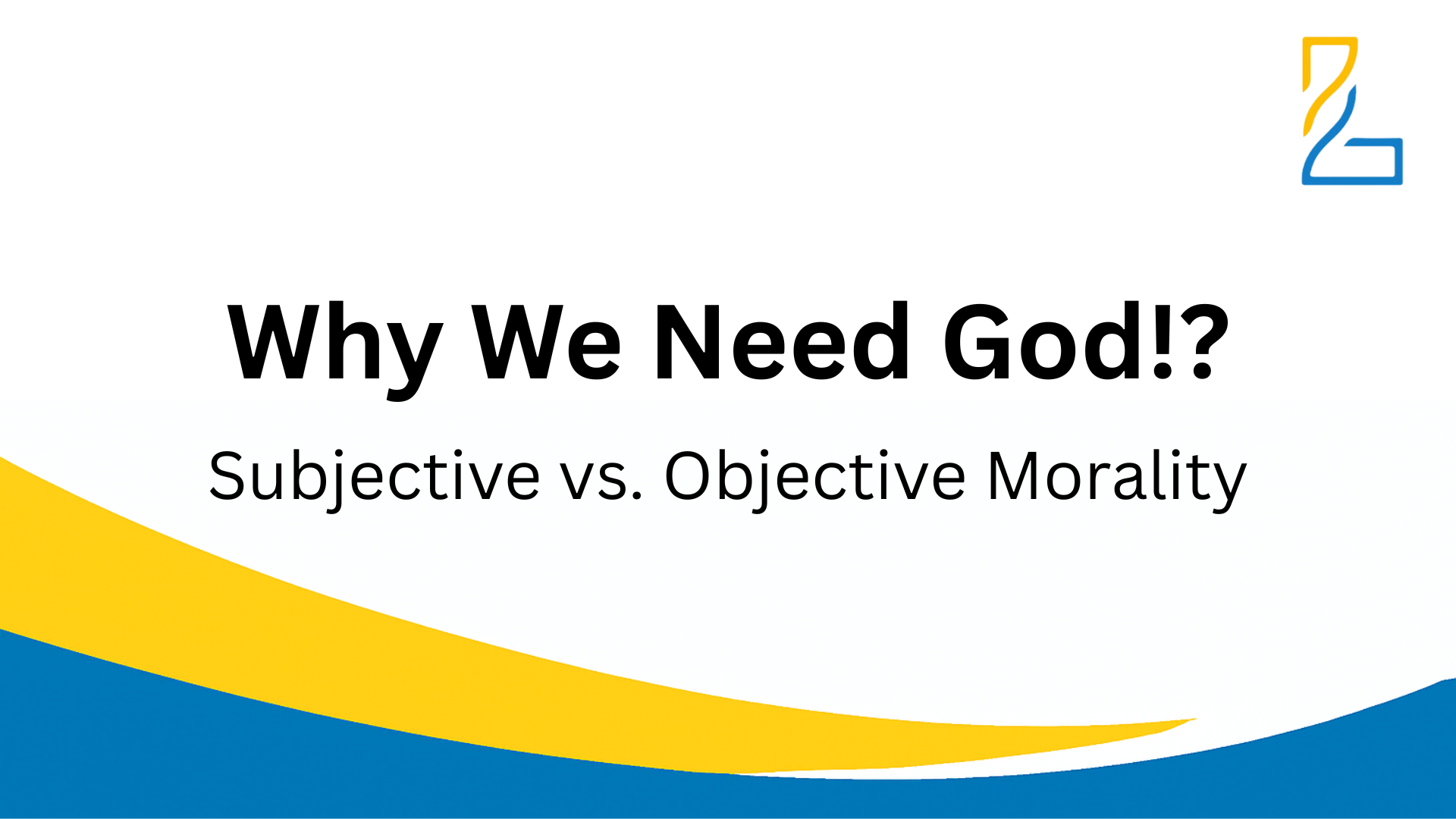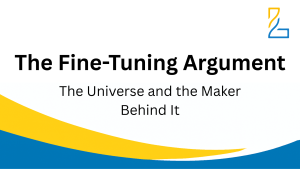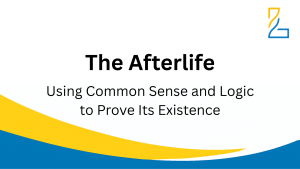Subjective vs. Objective Morality: Why We Need God
Morality is an essential concept that governs our lives, guiding us to make decisions between right and wrong. However, when we dive deeper, we realize that morality isn’t always as straightforward as it seems. It can be divided into two distinct categories: subjective morality and objective morality. The difference between these two perspectives can significantly impact how we view ethics, and ultimately, why we need a higher moral authority, which is God.
The Dilemma of Subjective Morality
Subjective morality suggests that right and wrong are based on personal feelings, opinions, or societal beliefs, meaning what one person thinks is right may be different from what another person believes.
Let’s take a look at a lively conversation that highlights the essence of subjective morality:
Person 1: So, what do you think “Good” really means?
Person 2: Well, “good” is anything that brings positivity to the world—things that help others and make people happy.
Person 1: Got it. So, what’s “Bad”?
Person 2: Bad is when you do something that hurts others or causes harm. Like, if you hit someone, they’ll get hurt. That’s definitely bad.
Person 1: Okay, fair enough. Now, let me ask you something tricky. Do you think homosexuality is wrong?
Person 2: Hmm, I wouldn’t say so. If two people love each other and aren’t hurting anyone, why would it be wrong? Love is a good thing, right?
Person 1: I see your point. But, what about having a physical relationship with your mother? Is that wrong?
Person 2: Whoa, what kind of question is that? Of course, that’s wrong! That’s just… weird. It’s not healthy, and no one does that.
Person 1: But why? On what grounds do you say that it’s wrong?
Person 2: It just doesn’t feel right. It’s taboo. Society frowns upon it.
Person 1: Exactly! That’s the issue with subjective morality. You’re saying it’s wrong based on feelings and what society thinks, but society is subjective, and it’s not a universal truth. People’s views change depending on where they are or how they were raised. Let’s take a look at something like marriage laws. In Pakistan, the legal age for marriage is 16, while in Bangladesh, it’s 18. If a 17-year-old gets married in Pakistan, it’s considered child marriage in Bangladesh. So, which one is actually right?
Person 2: Wait, you’re right. That’s confusing. Which one is the right age?
Person 1: Exactly! This is where objective morality comes in. There must be a higher standard—a moral authority who knows what’s truly right and wrong, one who sets the rules. That’s where God comes in. God defines what is right and wrong for everyone, regardless of personal opinion or societal beliefs.
The Necessity of Objective Morality
Now, let’s dive into the importance of objective morality. This concept asserts that morality exists independently of human opinion and is defined by a higher authority—God. Without a universal moral standard, we fall into confusion, where every society, culture, or individual can create their own set of rules. But for a society to thrive, for justice to prevail, and for us to truly understand right and wrong, there must be one consistent, reliable standard.
Person 1: So, how do we know what’s truly right or wrong then?
Person 2: I guess we need a higher power, someone who sees the bigger picture and knows what’s best for us all.
Person 1: Exactly. God is the ultimate source of objective morality. He sets the rules. Why is homosexuality wrong? Because God said so. Why is having a physical relationship with one’s mother wrong? Because God said so. Why is stealing wrong? Because God said so.
By grounding morality in God’s wisdom, we get a standard that is unchanging, reliable, and universal, regardless of personal opinions or societal pressures.
The Vegetarianism Paradox: A Moral Dilemma
Let’s explore an issue that often sparks debate: vegetarianism. Many people claim that being a vegetarian is morally superior because it avoids harming animals. But is it really that simple?
Person 1: Is vegetarianism morally good?
Person 2: Yeah, I’d say so. It’s good because we’re not killing animals for food.
Person 1: Okay, now I’ve got a question for you. Is breathing good?
Person 2: What kind of question is that? Of course, breathing is good! We can’t live without it!
Person 1: Well, here’s a thought—when we breathe, our body kills millions of germs and bacteria. So technically, we’re causing harm to those tiny organisms every time we inhale. Should we stop breathing then?
Person 2: Uhh… I see what you mean, but that’s different!
Person 1: Exactly! And while we’re on the topic, think about how vegetables are farmed. Farmers use chemicals to protect crops from pests, which means millions of insects are killed in the process. So, is vegetarianism really as morally clean as it sounds? After all, you’re still contributing to the death of countless creatures in the process of farming vegetables.
Person 2: Wow, that’s a tricky argument.
Person 1: It is! And let’s take it further. Why do you eat plants? Plants have lives too, right?
Person 2: Well, they don’t have consciousness. They don’t have a brain.
Person 1: But would you eat a dead fish or a dead dog? They don’t have consciousness anymore, either.
Person 2: No, I wouldn’t!
Person 1: But why not? According to your logic, there should be no problem with eating them, since they no longer have consciousness.
This is why we need objective morality. If we rely solely on subjective morality, we could justify almost anything based on personal opinions. But with objective morality, we can have clear answers about what’s truly right and wrong, based on an unchanging, higher authority—God. Without a universal moral standard, these questions can lead to confusion and inconsistency. We need God to provide the framework for what is truly good and right.
Why We Need God
Without a higher moral authority, such as God, morality becomes subjective—shaped by personal preferences or societal norms. What one person deems right may be considered wrong by someone else, leading to inconsistency and moral confusion. This lack of universal standards results in chaos, as there is no objective measure for determining right and wrong.
If there is no higher power to set the rules, the foundation of ethics becomes uncertain. Why live ethically if there is no ultimate accountability? Society’s laws, rules, and systems of justice show that we care about right and wrong. However, without an objective moral standard, morality becomes unreliable.
God provides this necessary standard—an absolute, unchanging truth that applies universally. Without God, morality would be left to personal opinion and cultural variations, making it inconsistent. We need God to establish a clear, objective moral framework that can guide everyone, everywhere, at all times.
Conclusion
In a world filled with moral dilemmas, contradictions, and differing opinions, we need objective morality—a universal moral law that applies to everyone, regardless of culture or personal belief. God, as the ultimate moral authority, provides this objective standard, ensuring that right and wrong are clear and consistent. Without God, morality becomes subjective, and society loses its moral compass.
Whether it’s debating what’s truly right or wrong, or whether we should live ethically at all, God provides the unchanging, objective foundation for all moral decisions. Subjective morality may lead to confusion and inconsistency, but objective morality—grounded in God’s wisdom—gives us the clarity and certainty we need to live righteous lives.




